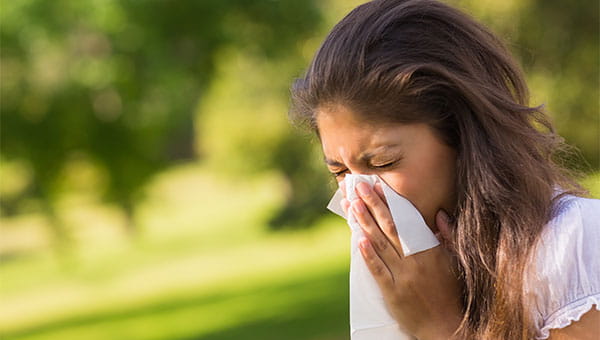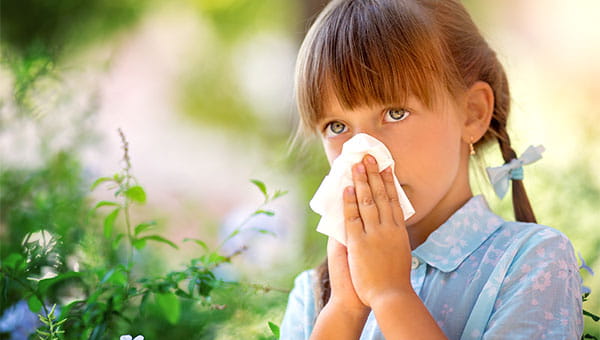Allergy/Immunology
With every sneeze, cough or tickle in your throat, do you wonder: Is it allergies or something else?
Don’t guess, get tested. BayCare’s primary care physicians can provide allergy tests, comprehensive diagnostics, expert care, ongoing treatment and management plans for adults and children throughout Tampa Bay. Don’t suffer needlessly, wondering why you don’t feel well. Schedule an appointment with a doctor today.
Testing and Diagnosing Allergies
Allergies affect as many as 2.6 billion people worldwide, which is 30-40 percent of all people. Annually, the U.S. spends $1.8 billion on over-the-counter medications to get relief. One out of every three people suffer from some form of allergy and up to 80 percent are allergic to more than one substance.
Everyone has their own unique combination of allergic triggers and not all of them are obvious. You may be sensitized to several allergen sources, but not enough to trigger symptoms when you’re exposed to only one of them. But when you encounter multiple substances that you’re allergic to at the same time, they can add up and you may start experiencing symptoms like itchy eyes or a runny nose.
Common allergy drivers include pollen, food, dust, medications, mold, animal dander, insect stings and pet dander. Determining if you’re allergic and identifying your allergic triggers can help you stay below your symptom threshold - the point where you start experiencing allergy symptoms. A simple test conducted by your primary care physician may give you the answers you need.
Allergy Testing: Understanding Your Options
Allergy testing is performed by a health care provider or allergy specialist to determine if your body is sensitized to a known substance such as pollen, pet dander, dust mites or certain foods. If you suspect allergies are the cause of symptoms such as itchy eyes, trouble breathing or skin irritation, it’s important to talk with your health care provider to determine if a test is warranted or if your symptoms may be caused by something else.Allergy testing is helpful for discovering what’s causing your symptoms so that your health care provider can create a treatment plan that determines what precautions to take and how to decrease your exposure to certain allergic triggers.
There are several different types of allergy tests including blood tests, skin-prick tests, food challenge tests and allergy provocation tests. Together with your health care provider, you can decide which test is best for you. Once you’ve an allergy test, the results are reviewed, alongside your medical history, to help establish an accurate diagnosis.
Allergy Testing Options:
-
Allergy Blood TestA blood test is a quick and simple way to get answers to your underlying allergy questions. Also called a specific IgE (sIgE) blood test, this powerful tool can help in accurately diagnosing your allergies by measuring the level of specific antibodies in the blood. These antibodies are an indicator of allergic sensitization and can help your health care provider determine if you’re allergic and to what.
How it works: A small sample of blood is drawn. The blood is sent to a laboratory for analysis. The results are returned a few days later for your health care provider to interpret. This powerful diagnostic tool can reveal potential sensitization to hundreds of possible allergens with one blood sample. Blood testing has fewer limitations on who can receive it or when it can be performed compared to other types of testing.
-
Skin-Prick Allergy Test 3In a skin-prick test (SPT), your skin is directly exposed to suspected allergens and observed for signs of a reaction. Although SPT can be done at a young age, the repeated scratching or pricking can be traumatic for small children. SPT can be difficult to use if you have a condition like eczema, if you’re actively taking an antihistamine, or if you have darker skin, which may make it hard to read the results.
How it works: The upper layer of your skin is punctured or scratched to introduce a very small amount of a suspected allergen to your immune system. A reaction similar to a mosquito bite may appear, usually within 20 minutes, indicating the presence of specific IgE for (sensitization to) this allergen. -
Food Allergy Challenge Test 3 5A challenge test, in connection with a blood test or SPT, is a powerful diagnostic tool. Also called an oral food challenge (OFC), it’s used to establish a correct diagnosis, which can be guided by the results from a SPT or blood test. A challenge test can be used to confirm a food allergy or to determine whether you’ve outgrown a food allergy.
How it works: You’re fed a small portion of a food that you have a suspected allergy to. You’re monitored closely for any clinical symptoms, usually in a medical (clinic or hospital) setting. If there’s no reaction, you eat increasingly larger portions of the food, up to a serving size. If a reaction occurs, the test stops. -
Provocation Test 6A provocation test is very similar to a challenge test. The main difference is that this type of test is usually used to test for suspected respiratory, medication or occupational allergy, not typically for food. It can be performed in the nose, eyes or lungs, as well as the mouth.
How it works: You’re exposed to small, but increasing quantities, of your suspected allergen. You’re monitored closely for any clinical symptoms. If there’s no reaction, you’re given more until a response is seen. If symptoms occur, the test stops. This test is rarely performed, and when it is, it’s usually done in a hospital setting.

Medical Services & Therapies
Managing Your Allergies
Talk to your health care provider about your allergies. Start by sharing a detailed history of your symptoms, including when the symptoms arise (time of day and time of year), whether you take medications for your symptoms and whether those medications help.
If you already have an idea of which allergens irritate your system or have a diagnosis after testing, then you can work with your health care provider to create an effective treatment plan. You might start by asking these questions:
- What are the treatment options?
- Should I be taking an antihistamine?
- If I should be taking an antihistamine, should I take it on a daily basis?
- Aside from the antihistamine, are there any other medications I should take?
- If medications don’t help, what’s the next step?
- Am I a candidate for allergy shots?
Your treatment plan will likely involve medications and lifestyle choices, which get the best results when applied together.
Make lifestyle adjustments to reduce your allergen exposure. People with food allergies need to avoid eating (and sometimes touching) certain ingredients, but people with environmental allergies may find it trickier to avoid their triggers. In most places, it can be nearly impossible to completely avoid airborne allergens like pollen and grass. It still helps to minimize contact with your allergens because below a certain level of exposure to allergens—called your symptom threshold—you won’t experience any symptoms. If your exposure to allergens crosses your symptom threshold, you’ll start to sneeze, itch and cough, whatever your reaction may be.
How can you stay below your symptom threshold if you’re sensitized to something in your environment? It depends on your allergens. Here are tips for tackling the most common ones.
-
Animal Dander
- Keep your pets out of the bedroom.
- Use a HEPA filter and vacuum regularly.
- Wash your pet weekly in warm water.
-
Outdoor Mold
- Avoid mowing the grass, handling mulch, composting and raking leaves.
- Keep doors and windows closed.
-
Pollens
- Shower after working outside and wipe off your eyelashes.
- Stay inside when pollen counts are high.
- At home, keep doors and windows closed.
Preventing Allergies
If you suffer from indoor/outdoor or seasonal allergies, it’s best to combine a treatment plan with preventive measures. There are a number of ways to help prevent allergic reactions:
Wear a mask
Examine food labels
Stay indoors
Use air filters or dehumidifiers
Reduce sources of mildew
Frequently change linens


Find a Specialist
Ready for the next step? We'll help you find a specialist for quality care and treatment.




